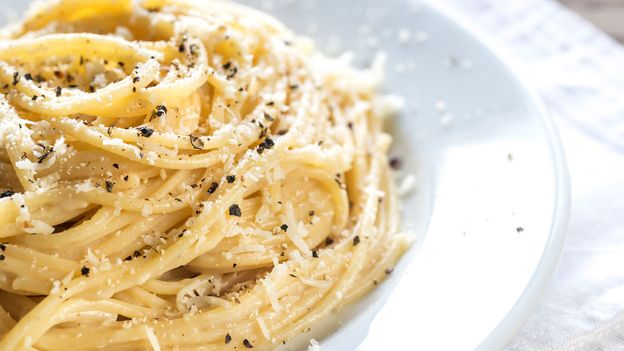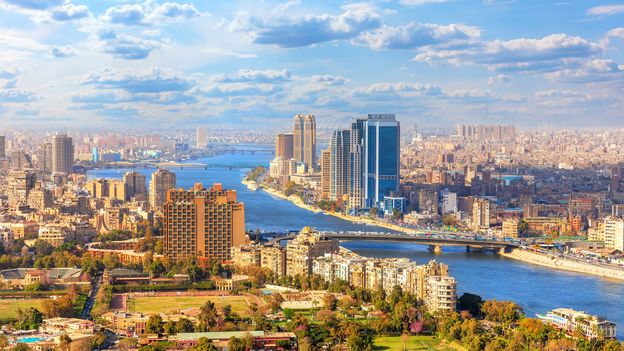Victory gardens: A war-time hobby that’s back in fashion
(Image credit: CSMimages/Getty Images)
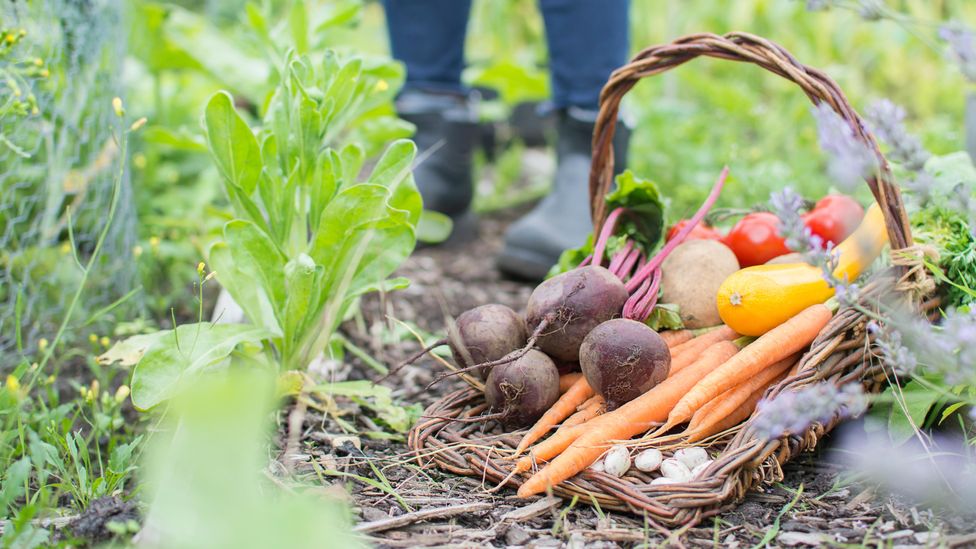
Across the UK and beyond, people are digging in their backyards, potting plants on balconies or using windowsills as suntraps for seedlings.
I
It was late March when the UK lockdown was first announced. Around the same time, I ordered a seedling tray and two packets of “Cut ‘n’ Come Again” leafy greens: arugula, rucola, oriental mustard, pak choy and borecole. Nearly two months later, lockdown still hasn’t been lifted, but my tufty lettuce leaves have shot up. For billions, globally, the Covid-19 pandemic has spelt a period of deep uncertainty and stagnation, but watching green miracles occur in my vegetable patch has been reassuring. I’m not alone in thinking so.
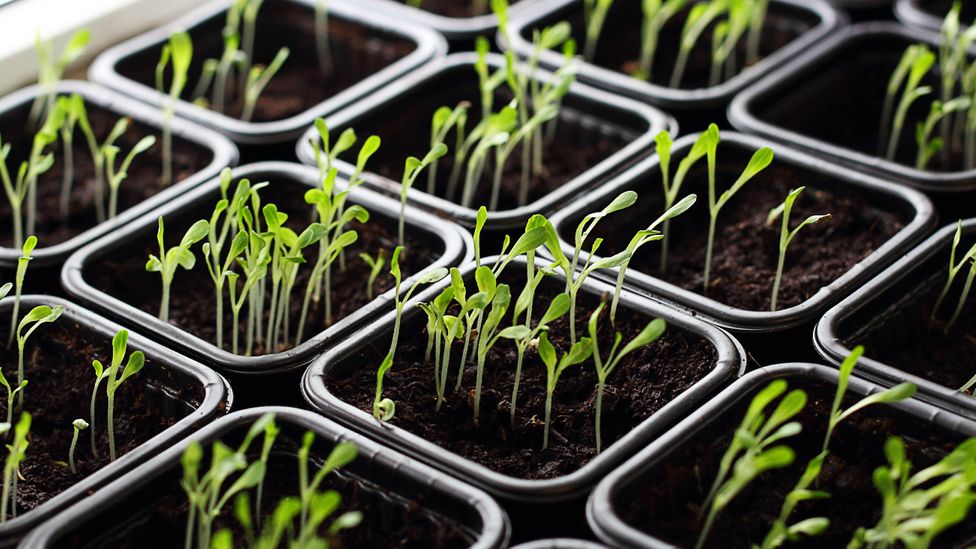
One result of the Covid-19 pandemic is soaring seeds sales, as people take food production into their own hands (Credit: LarisaL/Getty Images)
The early weeks of the pandemic threw the global supply chain into disarray, setting off a wave of stockpiling. The US saw a spike in alternative milk sales, Australia lacked flour on supermarket shelves, pasta was scarce in Italy and eggs in Britain. Many countries reported fears of labour shortages for perishables such as fresh vegetables, according to Time magazine. As with any crisis, people have been quick to take matters into their own hands – as highlighted by soaring seed sales.
You may also be interested in:
• A British feast from garden weeds
• The dish that ended the plague
• A dish born from the bomb
A recent report by the UK’s Office for National Statistics (ONS) shows 42% of Britons have taken to gardening to cope with lockdown, while a third of a million searched for tips on growing garden variety crops on the Royal Horticultural Society website – the most popular being the humble potato. Across the UK and beyond, people are digging in their backyards, potting plants on balconies or using windowsills as suntraps for seedlings.
The rush to grow-your-own has sparked comparisons to ‘victory gardening’. Dug either side of the Atlantic, from North America to Great Britain and further afield in Australia, these kitchen gardens became popularised in World War One and World War Two when shortages reached critical levels in the Allied nations. In response, governments coordinated domestic campaigns calling upon citizens to fuel the war effort and feed the country. Working the soil became a patriotic duty.

The success of Allied nations during World War One and World War Two is owed in part to “victory gardens” (Credit: CSMimages/Getty Images)
In the UK, most widely remembered is the “Dig for Victory” campaign launched by the British Ministry of Agriculture in 1939. It was so successful that the number of allotments grew to 1.7 million in just three years, while private gardens with vegetable produce numbered five million.
During the same period, a horticultural magazine paraphrased Napoleon’s claim that the English were a nation of shopkeepers, instead writing: “We might with equal justice be called a nation of gardeners”. The claim stuck. Our obsession with gardening stretches far beyond a national pastime; it is rooted in the British psyche. The garden is considered a private sanctuary but also a site of creative expression and personal pride, as reflected in the highly competitive British annual “giant vegetable” competitions that spring up from Harrogate to Carmarthenshire. For Britons, growing our own produce has the added value of bringing locals together.
Victory gardens were also not just about food: cultivating fruit and vegetables boosted morale and built momentum. Growing for the greater good banded together communities and enabled those stuck at home to play a part, however small. Perhaps this is why the gardens’ legacy can still be felt today. While using the analogy of war to describe a viral pandemic is controversial, it makes sense that we‘ve connected the two moments in time. It is the sense of community spirit we want to revive – and a victory garden quite literally says we are in this together.
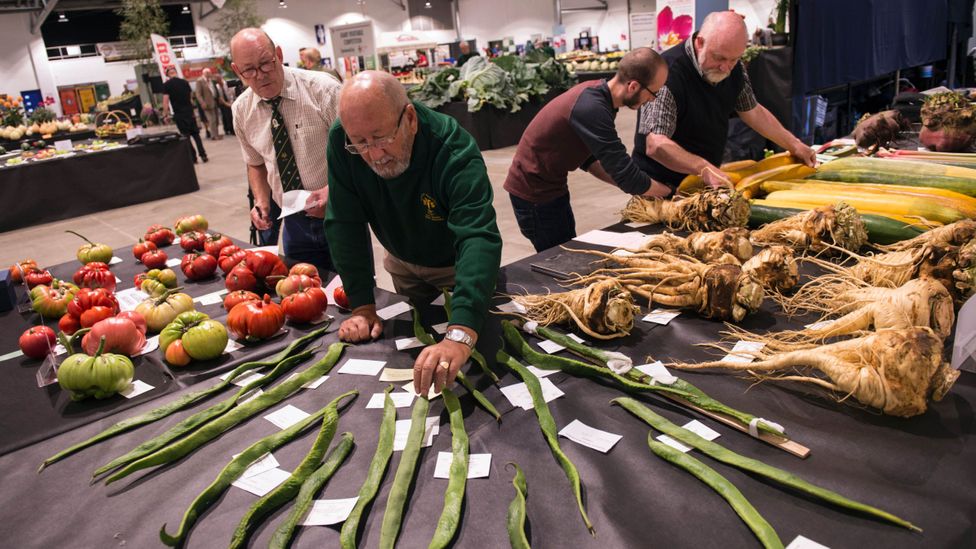
Britain’s annual “giant vegetable” competitions are hugely popular – and highly competitive (Credit: Oli Scarff/Getty Images)
Beyond caring for our own families, green-fingered types are sharing produce with their neighbours. A survey commissioned by the British charity RSA cited that 42% of respondents feel the outbreak has made them value food more, and 10% have shared supplies for the first time.
I first noticed the neighbourly potential of plants three weeks after lockdown had begun, when a neighbour I hardly knew knocked on the door of my house in Suffolk. When I answered, she leapt behind the gate: “Alpine strawberries,” she yelled, “Plant them in partial shade”. A week later, a trio of pepper seedlings appeared – another gift. To say thank you, I delivered fat garlicky leaves of wild ransom, foraged between bluebells in a nearby woodland. Now, we swap excited texts about her egg-laying tortoise, Rosie. Since then, I check what Jeanie and her husband, John, would like from the shops; why I waited for a pandemic to do this is beyond me.
Outside their gate, a sign offers willowherb and more wild strawberries – anything surplus they don’t need. “If someone likes something in your garden, you can just take a cutting for them,” John said. “It doesn’t cost you anything.”
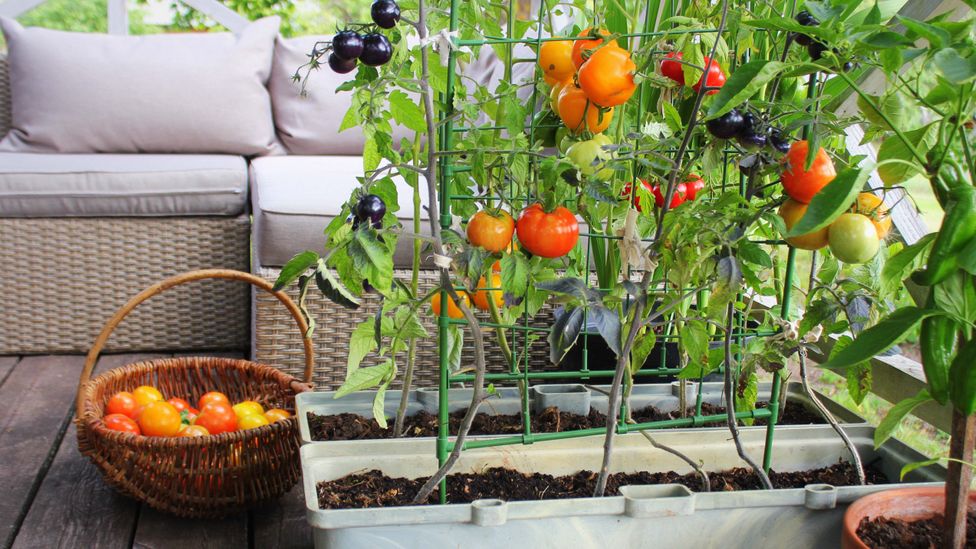
Tomatoes are a popular choice for gardeners with little space, as they’re adaptable and easy to grow (Credit: Vaivirga/Getty Images)
The Bristol Seed Swap has been promoting the circular economy of seed saving for years. A few days after lockdown, they advertised leftover seed packets from a previous event, which the public could request free of charge by sending a self-addressed stamped envelope. Diane Holness, a spokesperson for the non-profit, said swells of gardeners were in touch with requests. “We sent seeds to around 150 people,” she said. “I think everyone is aware that food prices are going up, and that fresh produce is going to be at a premium.”
The most requested seeds were tomato; adaptable and easy to grow. “I think they are one crop that can fit into even the tiniest space, even a balcony,” she said.
Luckily, the organisation had plenty. As Holness said, harvesting seeds costs you nothing, but goes a long way to helping someone else: “If you know how, you could almost save enough cabbage seeds for everyone in the city.”
Two hours west of Bristol, West Dorset’s foodie capital, Bridport, has been a hive of activity since lockdown. Created in response to quarantine, the Bridport Grow Your Own community Facebook group has played a large role in greening the town. Just as the 1930s Dig for Victory leaflets relayed growing information, online groups are helping new growers by circulating plant wisdom.
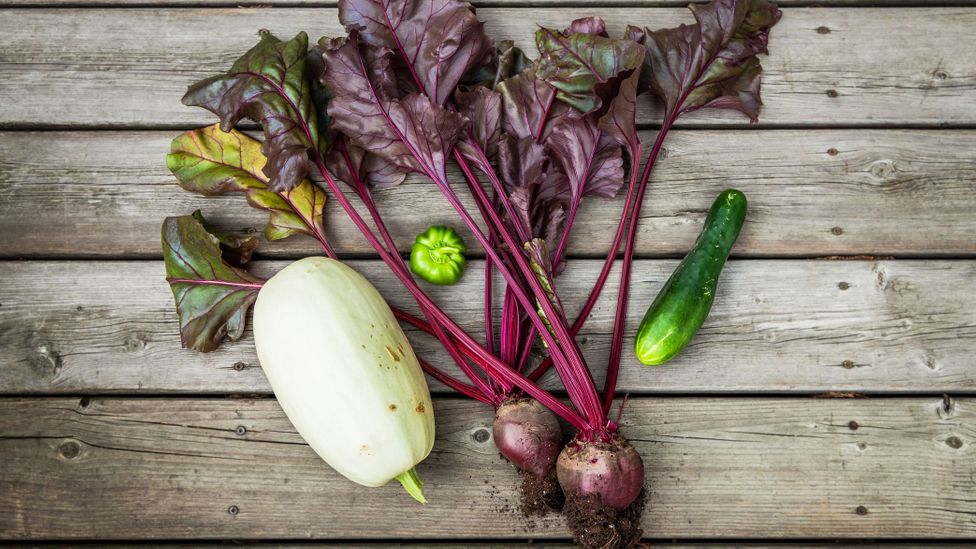
According to the UK’s Office for National Statistics, 42% of Britons have taken to gardening to cope with lockdown (Credit: BlokPhoto/Getty Images)
“As a town, I think we are all at it,” environmentalist and educator Kim Squirrel told me. “People have dug up their gardens and others are growing in pots.” She works a private allotment on the town’s edge, shared between 10 houses, that includes her neighbour Rachel Millson. Both have turned their full attention to growing with news of the lockdown. Squirrel’s potager garden is crammed with brassicas alongside beans, French to dwarf, winding up bamboo stalks that are also home-grown. Pear and espalier apple trees will fruit come the summer.
Millson’s garden exploits are equally impressive: overwintering crops such as earthy beetroot, onion and leeks fill up one plot. Another bed is an experiment in perennial vegetables, such as asparagus, that take less carbon from the soil.
“The pandemic has cemented in my mind the need to be growing more food, not just for my own family and to save money, but for the wider community,” Millson said.
She feels fortunate to have an allotment, but wishes there was more recognition that growing your own food isn’t just a pastime but “real, important work”. Millson strongly believes it has personal benefits and also aids community wellbeing. Pre-empting that food inequality is going to be at an all-time high, she has purposefully grown extra vegetable crops with a mind to donate them to a local foodbank.
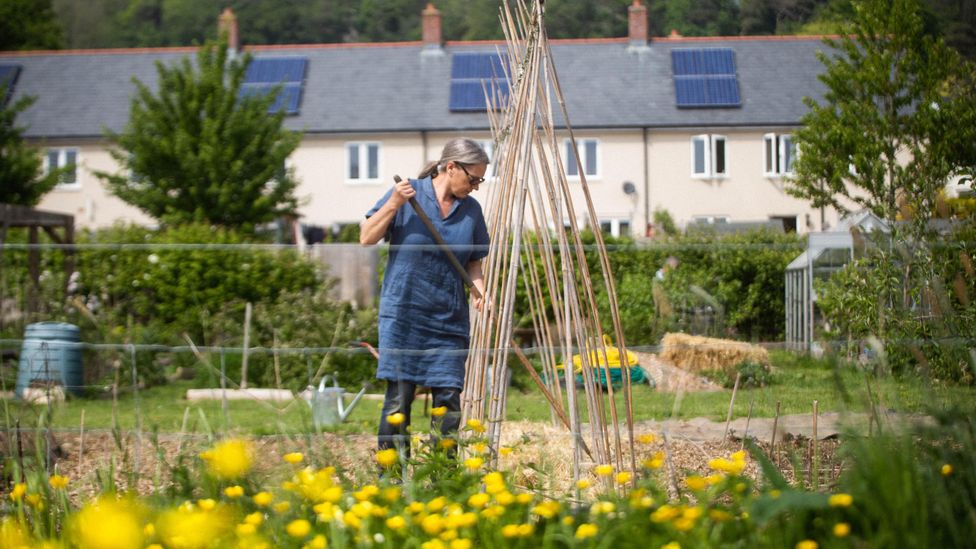
Rachel Millson shares a private allotment on the edge of Bridport with 10 other houses, and is growing extra produce to donate (Credit: Lily Colfox)
Part of the fun of growing your own produce is in sharing your hard-earned bounty with family and friends. But while delivering your overzealous courgette crop is practical, there is something special in giving someone a plant they can cultivate themselves.
Bruno White had just moved to Ditcheat, Somerset, when the UK went into lockdown on 23 March. He wrote to his new neighbours to introduce himself and set up an informal mutual aid group. One elderly gentleman he shopped for was so grateful that he left a collection of plants on White’s doorstep, each with handwritten instructions. Shortly afterwards, another thankful neighbour gifted him packets of biodynamic seeds: “He taught us about Three Sisters. It’s a traditional Native American method. You grow corn, then beans to climb up it, then squash to shade and stifle any weeds.”
White has since been cultivating his garden and has been surprised at how easy it is – and how kind his neighbours are. “We have common ground now, something other than the fear around the pandemic,” he said.
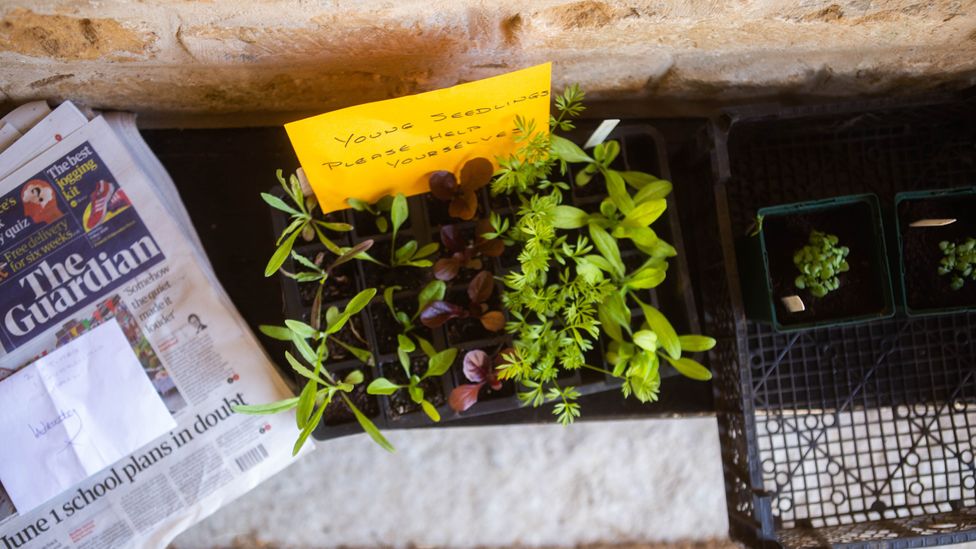
A new trend is gardeners sharing produce with their neighbours (Credit: Lily Colfox)
While the early days of the Covid-19 pandemic were filled with panic, hopefully it will be the incredible displays of neighbourly spirit that we will remember. The victory garden movement of the World Wars not only helped strengthen communities, but also gave home-bound individuals a chance to contribute to those fighting on the front line. Amid a pandemic, the vegetable garden has similar appeal: it offers a sustainable solution to food security that not only helps us, but allows us to care for our neighbours too.
At a time of uncertainty and confusion, even planting a lettuce seed can offer a semblance of hope.
Neighbourly love is an uplifting and emotionally engaging BBC Travel series that shows how acts of generosity can have profound effects in destinations around the world.
Join more than three million BBC Travel fans by liking us on Facebook, or follow us on Twitter and Instagram.
If you liked this story, sign up for the weekly bbc.com features newsletter called “The Essential List”. A handpicked selection of stories from BBC Future, Culture, Worklife and Travel, delivered to your inbox every Friday.





